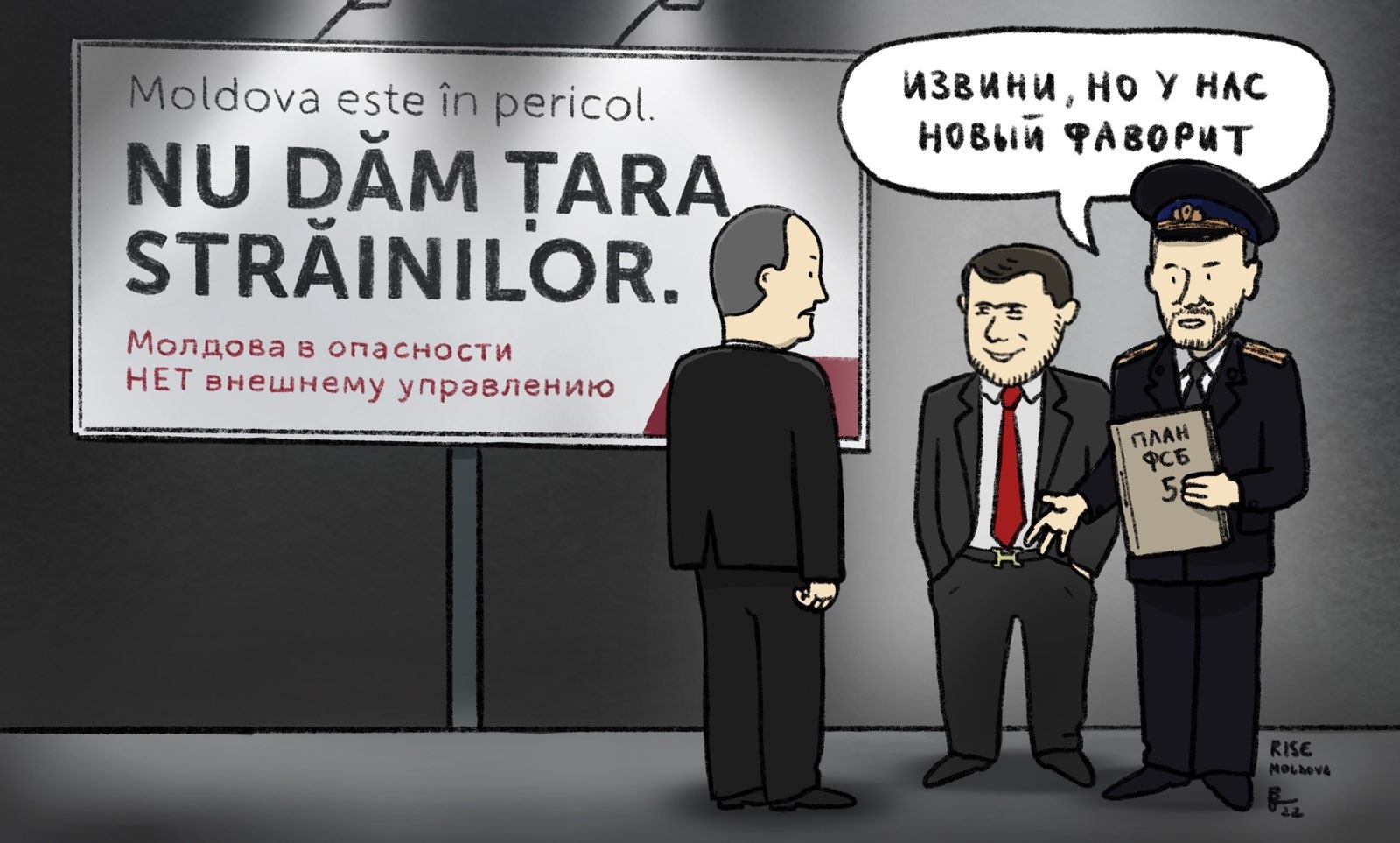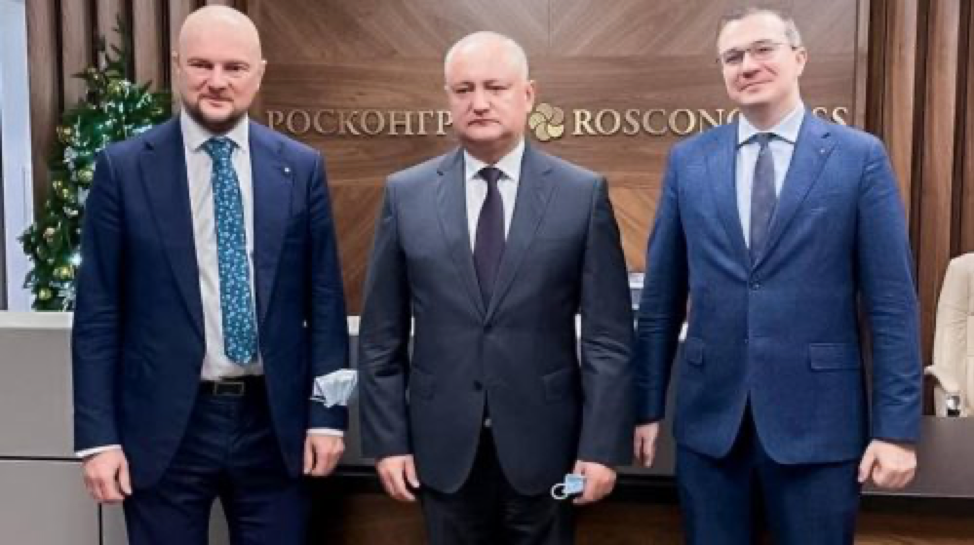Journalists from RISE Moldova and Dossier Center have learned:
• Who is the employee of the Russian Federal Security Service (FSB) in charge with coordinating Moldovan politicians;
• Who got used by Russian „siloviki” to influence electoral processes in Moldova;
• Who are the security officers who “oversee” the Transnistrian region and southern region of Ukraine under the diplomatic coverage.
25 December 2016. A board departing from Moscow lands at the Chisinau International Airport. A man with a Russian diplomatic passport arrived with that plane. His arrival coincides with the time when Igor Dodon was taking over the office of president in the Republic of Moldova.
The mysterious passenger was Dmitry Milyutin, a general at the FSB, and his visit would be kept off the press range. And yet his co-workers as well as Moldovan politicians they guided would play a major role in numerous secret operations inside Moldova’s politics.
Security services represent one of the basic instruments which the Russian Federation has been using in order to shape things in the ex-Soviet states. This is the conclusion of a classified note of the Russian General Staff for the Kremlin leadership. Our colleagues from the Dossier Center have passed this note to RISE Moldova.
The discrete passenger in question is the main character who is in charge with Moldova at the FSB. General Dmitry Milyutin, 55. RISE Moldova’s sources confirm the information passed by Dossier.
According to IStories, a Russian investigative portal, General Milyutin holds the rank of deputy chief of the Operative Intelligence Department of Directorate 5 in the FSB. The reports filed by Directorate 5, it said, were used by the Kremlin to take the decision to invade Ukraine.
„They fabricated, misinterpreted, sometimes even gave free rein to their imagination, and the management believed in all this with pleasure. For example, they wrote that the regions of Ukraine live separately from the authorities in Kyiv, and as soon as they are stimulated a little, they will rush to embrace Russia,” IStories quoted a former FSB official as saying.
„SUBTLE POLITICAL GAME”
A source close to Mr. Milyutin has passed to RISE Moldova and Dossier pictures made in 2017 at a feast celebrating the general’s 50th birthday. The pictures of Milyutin – the one who coordinates Moldova operations – and his buddies are published by RISE Moldova in premiere.
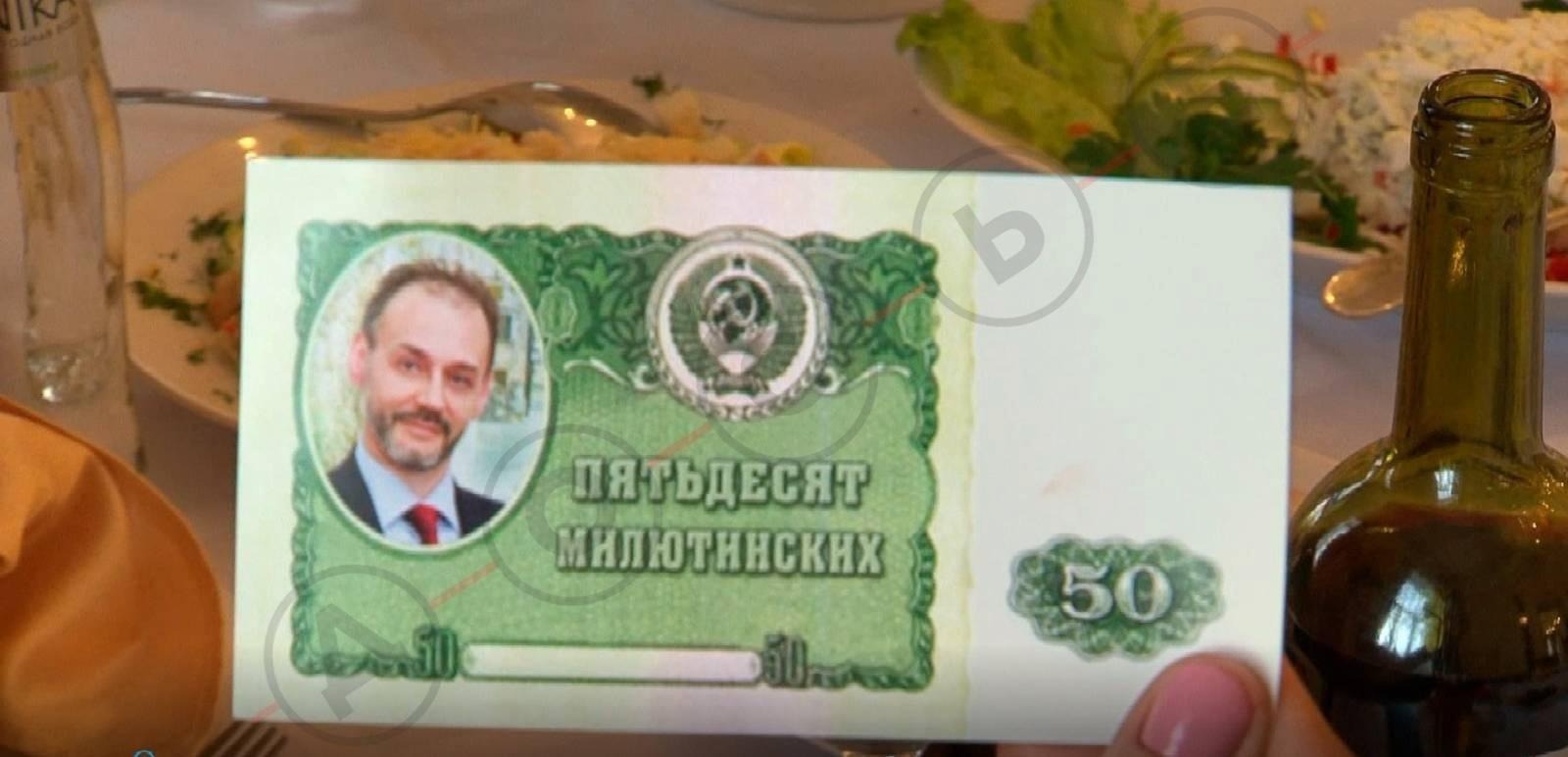
A comic styling of a Soviet-era banknote. Pictures from the party gathering on the occasion of FSB General Milyutin’s 50th birthday. Photo: Dossier
In those pictures, we’ve identified Valery Solokha, chief of Section 11 in the Operative Intelligence Department. Mr. Solokha is a subordinate of Milyutin and – just like his superior – he is in care of Russian interests in Moldova, the part on the right bank of the Dniester River. During the party, Mr. Solokha complemented his boss, and stressed: “Personally, I am an advocate of tough operations, […] but we are running a subtle political game.”
Earlier, Renato Usatii, leader of Our Party, spoke straight of Mr. Solokha’s “tough operations” and of FSB’s dealing in general. At a briefing in 2020, Mr. Usatii claimed that Solokha had pressed Our Party to support the re-election of Igor Dodon as Moldovan president, for a second term.

Natalya Milyutin (spouse), Dmitry Milyutin, and Valery Solokha. Photo: Центр „Досье”/ Dossier Center
Mr. Usatii’s allegations about the FSB’s influence in Moldovan politics are corroborated by other sources and data.
STRATEGY FOR SOCIALISTS
November 2019. President Igor Dodon films with his personal smartphone, inside the Socialists Party headquarters, a party with some 30 people celebrating the victory of their colleague Ivan Ceban in the mayoral elections in Chisinau, the capital of Moldova. From this footage we can see Vladimir Shirobokov, a Russian expert in so-called political technologies. Like Milyutin, he was born in Izhevsk, a city in the south-eastern part of European Russia.
RISE Moldova and Dossier have learned that Mr. Shirobokov had penned a brief electoral strategy for Moldovan Socialists ahead of the 2019 scrutiny. The document was also for the eyes of Dmitry Milyutin, the chief mastermind of Moldovan operations.
Mr. Milyutin also had the job of reviewing the strategies of Russian “consultants” during Moldovan Socialists’ election campaigns. More than that, some reports were passed via his spouse, Natalya. In other words, the FSB officer had been using his wife as a liaison person in illegal operations for the sake of political interference in Moldova’s affairs.
A report says, “the final result of this activity is to assess the preparedness of local staffs for electoral campaigns,” and the main objective is to “prepare the field for the arrival of a larger group.”
RISE journalists have also obtained two more documents whose author is Mr. Shirobokov. One is a record of a phone poll that was conducted ahead of the second round of mayoral elections in Chisinau on 3 November 2019, which Ivan Ceban, a Socialist, won, and the other is a piece of paper with numbers, reflecting records of expenses for electoral purposes – 19,000 US dollars.
Sources close to Socialists told RISE Moldova that Mr. Shirobokov had been involved in four electoral campaigns on behalf of the Socialist candidates: at the 2019 local elections, at the 2020 presidential election, at the 2021 early parliamentary elections, and at the election of the Balti city mayor in 2021.
Alexandr Nesterovschi, Socialist candidate for the mayor of Balti in 2019: „This bearded man is familiar to me. He’s a relative of one of our party’s members. He dropped into our office during one of our electoral campaigns. He stayed in Moldova for a week. His intention was to taste our wine. All I remember is his name – Volodya. I retained it because I barely had bearded people [in the office]. Yet he never worked with us. He didn’t draft any kind of strategies. We are capable of organizing [election] campaigns with our own forces.”
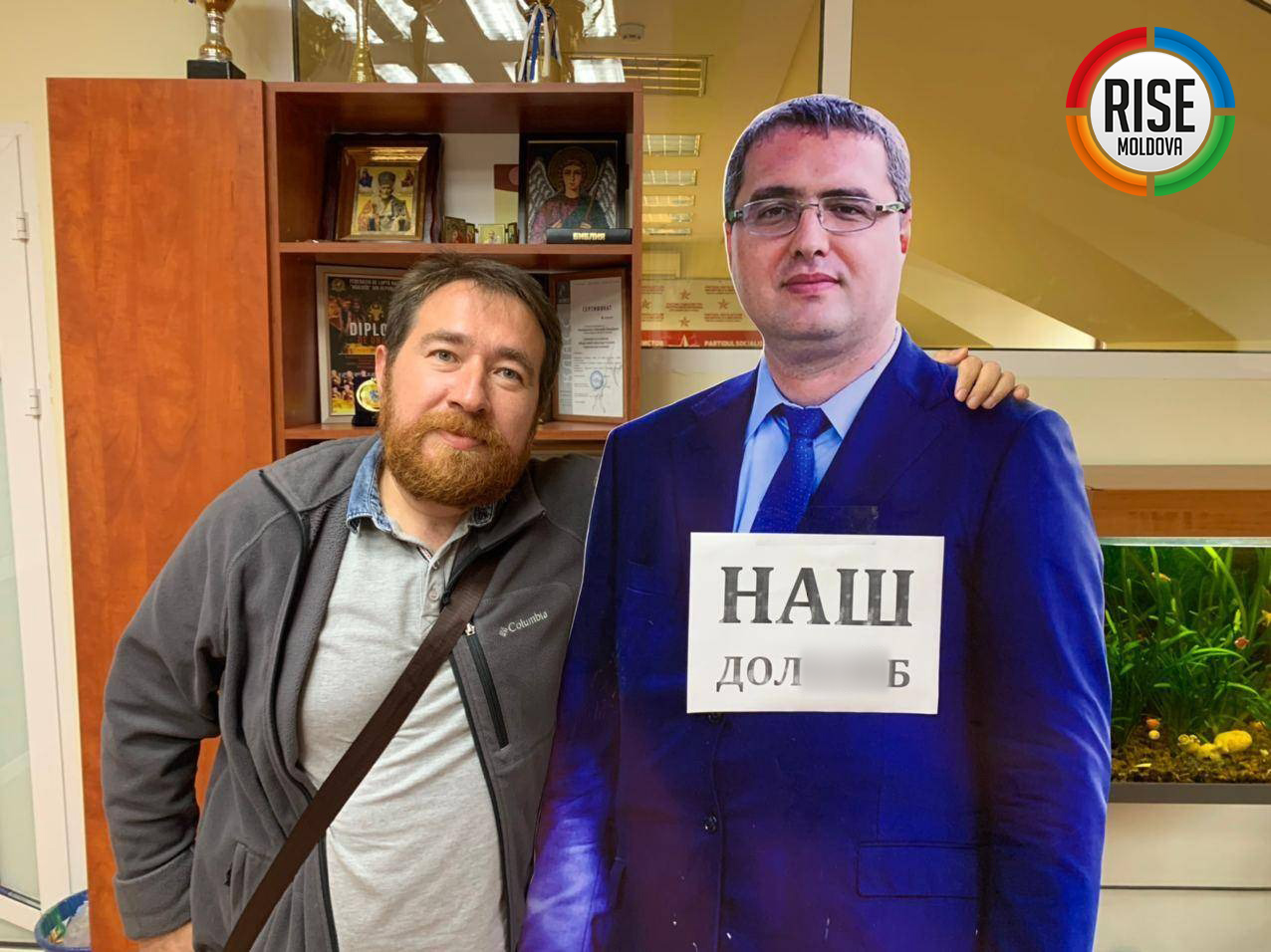
Shirobokov in a Socialist Party office in Balti, near a cardboard printout of Renato Usatii, a competitor for the Socialist candidate. Photo: archives of Vladimir Thorik /RISE Moldova
Contacted by us, Shirobokov avoided the conversation. Upon hearing that a RISE Moldova journalist was going to interview him, he terminated the call and never replied any time later our repeated calls.
FSB EXPERTS IN POLITICAL TECHNOLOGIES
The video taken by Mr. Dodon also shows another person enjoying the victory of Ivan Ceban alongside Mr. Shirobokov; it’s Olga Grak, a political technology expert from the Russian enclave of Kaliningrad.
In October 2022, the United States slapped Mrs. Grak and two other of her co-workers – Yuri Gudilin and Leonid Gonin – with sanctions for the Kremlin’s dirty activities in Moldova. Details, HERE
Sources close to the Socialists Party claim that it was her who managed the electoral campaign in favor of Mr. Ceban in 2019 and that she actually led in Moldova a team of Russian consultants who aided Igor Dodon in 2020; the latter lost his re-election to his rival Maia Sandu. Details, HERE
Moldovan governmental officials said that Mrs. Grak later coordinated a group of Russian election consultants who worked to help the staff of Ilan Sor during the presidential election in 2020 and the parliamentary elections in 2021. In October 2022, Mr. Sor, a businessman turned politician and the fugitive leader of a political party bearing his name, got American sanctions too for his role in Russian operations.
An intelligence agency officer of a European nation confirmed: “Olga Grak coordinated a plan to reform, optimize, and grow the Sor Party during 2021, in the context of the parliamentary polls.”
FSB PROTEST IN CHISINAU?
A number of politicians as well as officials with SIS, Moldova’s domestic security service, told us that the meetings organized by the Sor Party in Chisinau downtown represented in fact an operation run by FSB officers under the command of Dmitry Milyutin; they did not share any evidence to support their claims.
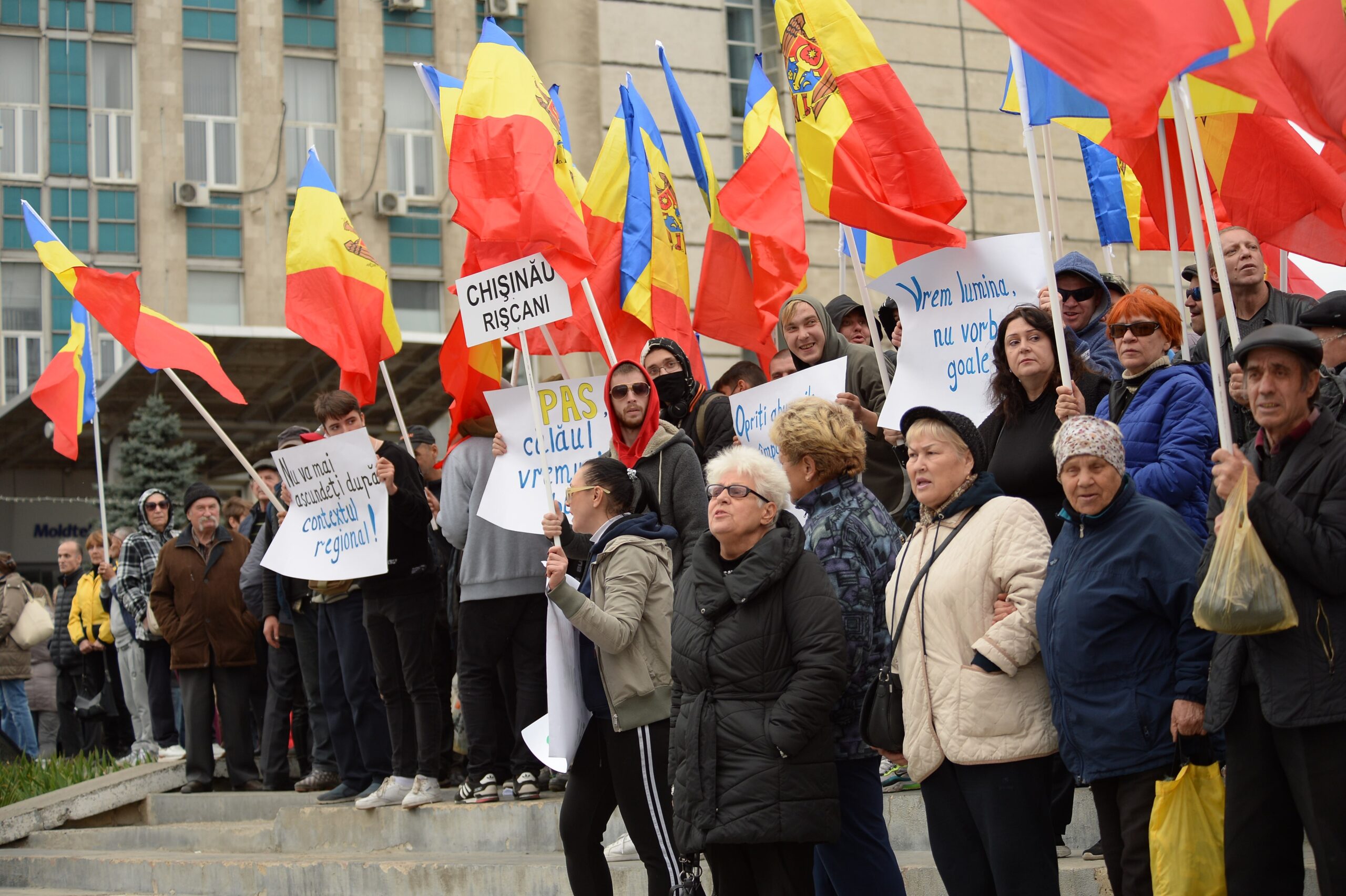
Protests under the Sor Party umbrella in the center of Chisinau, 30 October 2022. Photo: Constantin Grigorita / RISE Moldova
Protesters installed tents in the center of Chisinau in September 2022, as part of a campaign by the fugitive businessman. The meetings initially were held in front of the Parliament and the Presidential Administration, and later moved to the street side near the Prosecutor-General’s Office. Mr. Sor said people came to express their anger over the hardships for which the actual government was to blame. Many protesters spent the nights sleeping on the ground.
Ilan Sor himself hides in Israel. In Moldova he has been formally charged with conspiracy to fraud and fraud: during 2012-2014 he planned and drained three commercial banks out of around one billion US dollars in what is now called “The Theft of the Century.”
RISE Moldova extensively covered in 2020 the participation of Russian experts in manipulation techniques as consultants for Socialists, who did not bother to notify the Central Election Commission of foreign services. The series of investigations got published under the tag “Kremlinovich”, but neither election officials nor law-enforcement agencies cared to investigate then. Details, HERE
After the victory of the Action and Solidarity Party, led by Maia Sandu, in the parliamentary elections, in May 2022 prosecutors ordered a search in the Chisinau home of Igor Dodon. The former president now stands accused of four counts of crime, including high treason.
MILYUTIN AND HIS TEAM
According to data from IStories, the FSB’s Operative Intelligence Department is run by General Gyorgy Grishayev, 59. He is believed to be a protégé of Sergey Beseda, his superior and chief of Directorate 5 (which includes the Operative Intelligence Department).

Sergey Beseda, Directorate 5 of FSB Gyorgy Grishayev, Operative Intelligence Department within FSB Directorate 5 Dmitry Milyutin, deputy head of Operative Intelligence Department, in charge with Moldova and Belarus Valery Solokha, Section 11, in charge with Moldova within FSB Directorate 5 Ivan Korol, Operative Intelligence Department, in charge with the Transnistrian region
Otherwise, Moldovan and Ukrainian security officials we’ve talked share the opinion that, for the current leadership in Moscow, Moldova and its breakaway enclave “mean no more than a bridgehead while the core goal is to get control over Ukraine’s south-eastern regions that border with Moldova.”
SEPARATISTS ON-LINE
RISE Moldova journalists have analyzed the phone conversations of Grishayev and Milyutin between November 2021 and May 2022, thanks to a data leak made available by the Dossier Center. We learned that both generals had often engaged in unsecure phone calls with acting and former high officials of security services in Russia-backed separatist enclaves.
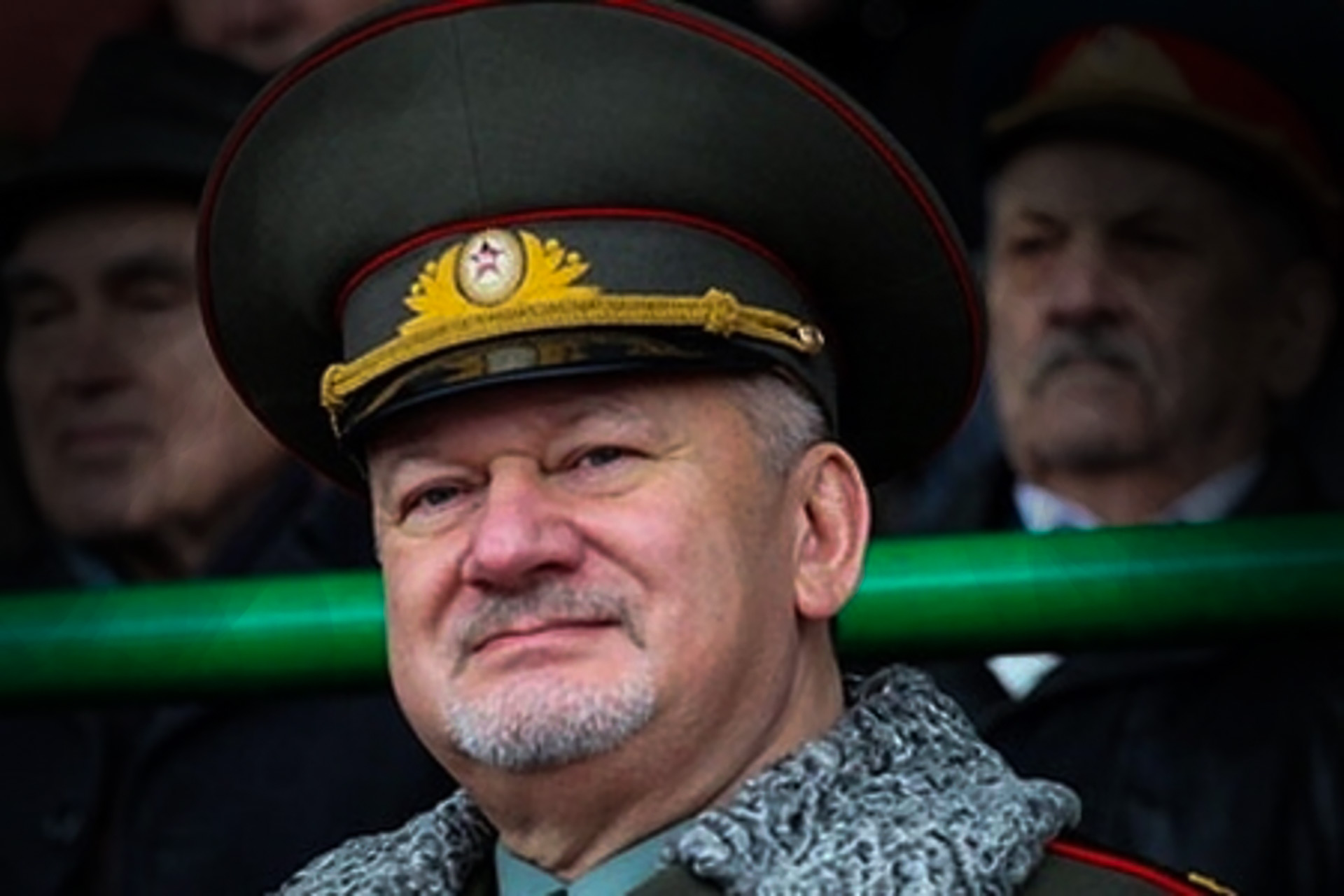
Vladimir Antyufeyev, who between 1992 and 2012 had served as Transnistria’s security chief. In 2014, Mr. Antyufeyev was appointed deputy premier of the unrecognized Donetsk People’s Republic, taking charge of the so-called siloviki bloc Foto: arhive RISE Moldova
For example, one of the men Mr. Grishayev had often contacted is Vladimir Antyufeyev, who between 1992 and 2012 had served as Transnistria’s security chief. In 2014, Mr. Antyufeyev was appointed deputy premier of the unrecognized Donetsk People’s Republic, taking charge of the so-called siloviki bloc. Moldova issued an international arrest warrant on Antyufeyev’s name, and Ukraine did the same in 2017. Details, HERE
We’ve drawn a somewhat similar conclusion after a thorough review of Mr. Milyutin’s calls. During the same period, he had talked a lot to Viktor Shargayev and Oleg Shiran, former and – respectively – current chief of South Ossetya, a breakaway Georgian region. After the Russian invasion of Georgie in 2008, South Ossetya declared its independence but remained de facto under Moscow’s control.
CALLS ON TERROR ATTACK DAY
If Valery Solokha is responsible for “mainland” Moldova, then it’s Ivan Korol, a 59-year-old FSB officer, who oversees Russian interests in the Transnistrian region. Unlike his boss Milyutin, who has not visited Moldova since 2016, Mr. Korol comes and goes on a regular basis. Moldovan border police reports show that Ivan Korol travels to our country two or three times a year, each time for a 3-6-day timeframe. His last visit was recorded in February 2022, approximately one week before Russia invaded Ukraine.
The statistics of Grishayev’s and Milyutin’s phone calls demonstrates that Ivan Korol had been in direct contact with both. Out of the eight phone Korol-Grishayev calls we’ve found, four were recorded on the days Transnistria experienced terror attacks.
25 April 2022, Tiraspol. Time is around 17:00 or 5 p.m. Unknown men fire a grenade launcher at the headquarters of Transnistria’s state security ministry.
The same day, Mr. Korol called his superior Grishayev twice. Both calls before the explosion, the last one just two hours ahead. New blasts took place early the next day, in a village called Mayak of Grigoriopol District. Two antennas used to rebroadcast Russian radio and television waves in the region were blown up. A release from the Transnistria interior ministry named the time of the attacks: 6:40 and 7:05 AM.
This time over again Mr. Korol called Grishayev, less than two hours before the first explosion. Neither Korol, nor Grishayev have been available to comment on the incidents.
The fact that FSB officer Ivan Korol keeps close working relationships with Transnistrian security services is demonstrated by numerous pictures obtained by our colleagues from the Ukrainian investigative projects Skemy.

In one of the pictures, Korol (center) poses with the Tighina Fortress on background, Transnistria. He is in the company of Vitaly Sukhodolsky (right), deputy minister of security in the breakaway region and the man in charge with operative intelligence. Photo: Shemy/RISE Moldova
SCENARIOS ON OCCUPATION OF MOLDOVA
In the summer of 2022, a Russian analytical center associated with the FSB – Alfa-Grup – prepared a detailed analytical report on the political situation in Moldova. Its staff reached a conclusion that is typical for Russian intelligence: the country was captured by and is under the control of Western interests, with Romania and the United States in the first line.
Alfa-Grup claimed that “the Sandu regime” would soon usurp the power for good and would destroy the pro-Kremlin opposition. As a consequence, it went on, Moldova would begin the blockade of its eastern region and blackmail Russia militarily.
Alfa-Grup developed three scenarios of an attack on Moldova:
(1) Cutting out a land corridor through southern Ukraine up to Moldova’s national border – which coincides with Transnistrian administrative boundary, with the official recognition of Transnistrian independence (Russia currently recognizes the region as a part of Moldova);
(2) Conquering the whole of Moldova;
(3) Advancing militarily through Transnistria up to the Dniester River, without recognition of Transnistria’s independence.
The authors of this plan believed that an operation according to the first and last points is flawed with the loss of control on Moldova while the open invasion would attract “a collective roar in the West” and give rise to local resistance.
Alfa-Grup suggested that force was premature and instead a long-term game was more appropriate in order to keep Moldova orbiting around Moscow and to drag the small country closer. Its analysts proposed “a new public contract” for Moldovan society, with a referendum regarding its implementation.
To achieve this goal, Moldova “needed” new political forces that would lobby for seeking the status of a Russian federal territory or other solutions, and all to be done in the name of the people. The same project provides for creation of a “government in exile” and formation of battalions of Moldovan volunteers fighting in Ukraine on Russia’s side.
DIPLOMATIC TANDEMS UNDER FSB TRADEMARK
Thanks to data from border police reports, RISE Moldova was able to identify a travel cliché: since mid-2014 – the time Russia annexed the Crimean Peninsula from Ukraine – Russia used to send two to four men with diplomatic passports a year to Moldova. Most of them spent in Moldova one year and then left without ever coming back.
A scrutiny of their passports has revealed that they were issued with consecutive series numbers, exactly as it happened in the case of two would-be Russian assassins of Sergey Skripal and his daughter Yulia in the United Kingdom – Alexander Petrov and Ruslan Boshirov. The due were officers with the military intelligence GRU using diplomatic coverage.
According to the Dossier Center, every third visitor with a Russian diplomatic passport has ties with the FSB.
Of the 24 persons we have identified, some had passports indicating the official residence in a military unit, in FSB border guard offices, or service apartments of intelligence agencies. Others were openly recognized as FSB employees.
List of persons who arrived in Moldova by air, with diplomatic coverage
Name, Surname, Father’s Name Birth Place
Yefremov Alexey Vasilievich Khabarovsk, Russia
Gavrilov Nikolay Gennadievich Chuvashya, Russia
Shipitsin Egor Vasilievich Pskov, Russia
Romashin Andrey Vladimirovich Sverdlovsk, Russia
Loktanov Denis Mikhailovich Kaluga, Russia
Biryukov Yevgenny Ivanovich Krasnoyarsk, Russia
Zayrov Dmitry Olegovich Moscow, Russia
Savkov Dmitry Valerievich Krasnoyarsk, Russia
Marchenko Anatoly Igorevich Moscow, Russia
Rodionov Alexander Ivanovich Kaliningrad, Russia
Safin Oleg Timurovich Uzbekistan
Popov Dmitry Petrovich Voronezh, Russia
Orlovetz Nikolay Nikolayevich Almaty, Kazakhstan Registered in the headquarters of the FSB border guard service (1 Myasnitzkaya Street, Moscow), now he lives in Moscow, in an FSB-paid apartment
Bekarev Viktor Viktorovich Novossibirsk, Russia
Registered in Chelyabinsk, in the office of the FSB border guard department of the Przhevalsky border guard regiment (military unit 2420).
Rymar Andrey Alexandrovich Kursk, Russia In 1993 he graduated from the Far-East Higher Combined Arms School in Blagoveshchenskoye city of Amur Oblast (Region)
Muraviov Vadim Alexeyevich St. Petersburg, Russia
Serviceman or equivalent rank
Korol Ivan Dmitrievich Lvyv, Ukraine
Head of Transnistrian section of FSB’s Directorate 5
Krotov Yevgenny Viktorovich
Havana, Cuba
His formal workplace as indicated: Chief of Staff officer of FSB Border Guard Command, military unit 2139
Fedotov Dmitry Alexeyevich Moscow, Russia
His father serves in military unit 95 006 (Chief Department of Special Programs of the Presidential Administration – special underground, bunkers)
Klimanov Sergey Mikhailovich St. Petersburg, Russia
Lives in a Moscow apartment block where many FSB, GRU, and SVR officers live
Dynyak Sergey Viktorovich Khabarovsk, Russia
Served earlier in military unit 2567 (FSB border guard institute in Golitsino city of Moscow Oblast)
Sundukov Alexander Alexandrovich Marji El, Russia
Served earlier in military unit 2567 (FSB border guard institute in Golitsino city of Moscow Oblast)
Ryabov Dmitry Nikolayevich Moscow, Russia
A former member of paratrooper special team
Ultimately, we have spotted the head of the “Transnistria section” of the Operative Intelligence Department of FSB’s Directorate 5 among the above-mentioned “diplomats”: Ivan Korol, a subordinate of Dmitry Milyutin.
FOUNDATIONS, ACTING AS FRONT INSTITUTIONS
Besides discrete visitors with diplomatic passports, Moldovan politicians meet sometimes representatives of nonprofits or charities with connections with Mr. Milyutin. Sometimes they travel to Moscow for meetings.
Take, for example, Grigory Velikikh, deputy director of Roskongress Foundation (Russian Congress), who happens to be familiar both with Milyutin and Dodon. The foundation came into existence in 2007 and is designed “to contribute to the development of economic potential, promotion of national interests and image-making in favor of Russia.”
In the spring of 2020, Chisinau Mayor Ivan Ceban signed an agreement with Roskongress, seeking to “work out a general plan for the development of the city and creation of a joint center for the management of investment and infrastructure projects.” RISE Moldova has asked the mayor’s office in a formal request to share with us information about the intended cooperation. By the time this article went online, we received no reply.
Mr. Velikikh was spotted among the guests celebrating the 50th birthday of Dmitry Milyutin. Although he apparently holds a civilian job, in his toast for the FSB official he called him “commander” and recalled his joy of collaboration [with Milyutin / FSB]: “Working with the team of Dmitry Vitalievich Milyutin, we’ve achieved many outstanding results. This is why, during our labor, he has become for me an important and outstanding person, a mentor and commander with capital letter.”
We are not really aware what is Mr. Velikikh’s field of labor or specialty with Milyutin as his coordinator. From open sources we know that Grigory Velikikh has vested some interests in Moldova too.
By one count, in October 2021, Mr. Velikikh received in audience Igor Dodon, the Socialist politician who one year earlier suffered defeat in the Moldova presidential election. Mr. Dodon’s status was chairman of the Moldovan-Russian Business Union.
P.S. The next part of our investigation tells the story about the money Igor Dodon received from the Russian Federation in 2021 and 2022, as the leader of a nonprofit. Visit us back to learn who sent the money and why.
Vladimir THORIK (RISE Moldova), Sergey KANEV (Dossier Center)
Editing: Nicolae CUȘCHEVICI
